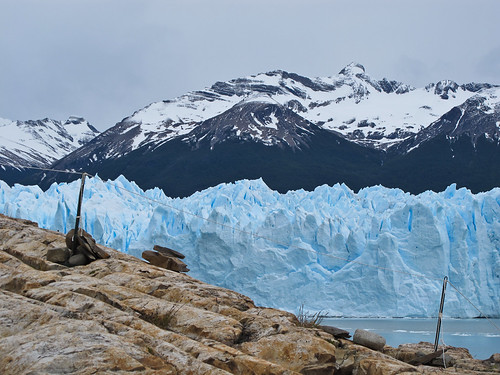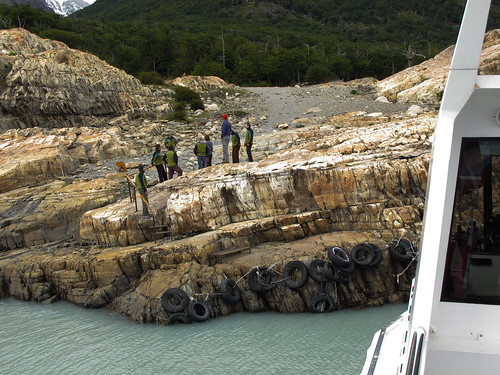**This post is Part II in my three part series on the Perito Moreno Glacier. View Part I or skip to Part III.
As the ferry blasted across the lake’s smooth surface, deftly dodging floating icebergs with the appearance of giant sized ice cubes floating in an oddly colored martini, I had to chuckle. Our dock, if it can be called that, was little more than a rock outcropping with a series of old tired tires chained along its face. I watched our approach, pondered briefly the probability that I’d end up getting shipwrecked again, then shrugged and went back to staring at the glacier.
Our docking procedure was as flawless as one might expect. Closely watched by our guides we transferred onto dry land, formed up for a brief orientation and then split into smaller groups. We bid goodbye to those going on the minitrekking trip, and our smaller and more dedicated band set off towards the glacier.
The glacier was massive. It is a glacier after all. That said, it wasn’t until we paused and watched small groups of people make their way out onto the ice that it really struck me just how massive and awe inspiring the glacier was. From afar the groups of people looked more like small specks of dirt than people.
Our trail led us down and across the coast towards the glacier. The path wound over rock outcroppings and along stone beaches backed by a few skeletal trees with rich forest and vegetation further inland. In the distance incredible snow capped mountain walls faded away into the clouds.
It’s hard to say why, but the clean white and rich blues of glaciers always surprise me. Given the pollution caked onto and often staining the white marble of major Cathedrals and statuary the fact that the glaciers manage to remain such a pure white excites me.
While not always ideal for photography, I love seeing certain types of locations on misty days. A periodic light rain, and the lack of wind is ideal for wetting down rocks and vegetation while leaving things with a richer look and feel. My voyage along and eventually out onto Perito Moreno was one such occasion, though for obvious reasons the rain didn’t do much to bring out the color once actually ON the glacier!
After reaching the base of the glacier we passed a larger base camp where the minitrekking people were suiting up and preparing to head out onto the ice. We paused briefly, then turned and began up along a small path, just wide enough for one person. It traced its way up along the glacier’s edge and alternated between being sandwiched and carved into the cliff face.
As we wound along the path I was taken off guard by the number of waterfalls which were visible. In retrospect it makes sense, with snow melt up on the mountain’s peaks, the water would have to melt and run down. Still, with snow and ice surrounding us I was taken off guard by the large falls each crowed by lush vegetation and blooming flowers which cut across our path. Though not tramping through snow, I could not help but fancy myself climbing into a dangerous mountain pass as part of an intrepid company of stalwart explorers of Tolkienesque fame.
A mile in our trail climbed up and into the moss covered vegetation, but not before a steep and muddy switchback. At the top we found a small base camp built to survive hearty weather. Our guides quickly explained that we’d be donning our safety harnesses and would be issued our crampons before heading back down and out onto the ice.
What is a Crampon? It’s a re-sizable metal shoe, not unlike strap on roller skates. You sandwich your shoe onto the top of the crampon, then carefully strap and clamp it down. The crampon itself is little more than a flat shoe base with large spikes protruding down and out from it. Made for icy conditions, they allow you to dig into the ice and turn otherwise difficult walking conditions into leisurely strolls.
Crampons attached, we struck out and began our trip across the ice. As we prepared to travel up and out onto the glacier we split into smaller groups of 8-10. Though wearing harnesses we did not need to tie ourselves together or ever really approach anything nearly dangerous enough to feel as though it was necessary.
The path our guide took us down wound up along the edge of the glacier for a while and then down through large fields of dirty ice that looked like massive ant colonies.
Our guides explained that what we were seeing was the stone which had been carved off of the mountainside, then gathered together as the top levels of the glacier melted. As other parts of the glacial ice melted away, the areas underneath the accumulated stones and dirt remained protected and cool creating small rock covered ice hills. All in all a pretty fascinating process which left deep blue, rock hard ice underneath the stones.
After getting accustomed to the ice, our crampons, and the rules of the road we struck out along a smoother area on the glacier. With gentle rolling ice hills it still offered access to a plethora of small crevasses and min ice-falls, but lacked the jagged, shark tooth like feel I had expected after seeing the glacier from afar.
Along the path we wound past, over, and along a series of small surface streams which cut their way from tiny pool to tiny pool before eventually diving into a crack and cutting their way down into the glacier’s inner bowels.
As we neared the halfway mark I paused briefly and turned around. As i did so, I stumbled slightly and let out a sharp intake of breath. The view back the way we had come was incredible. It was one of those moments that feel straight out of the movies. Fairytale crafted into reality so powerful, so magnificent it takes you several moments to accept it as real. Was this middle earth? Perhaps not, but it sure was indistinguishable from it. A long expanse of ice, stretching out before me towards charcoal grey mountains, thousands of feet tall stretching in either direction like a massive wall. A wall cut and carved by giant waterfalls tracing their way down from the snow capped peaks and periodically crowned by small mountainside forests of a rich green so dark that it almost blended with the gray-black of the mountainside. Words fail to describe the majesty of the experience.
The falls, cliffs and general feel of the experience reminded me heavily of the Norwegian Fjords. Though in this rare case the falls were larger and the backdrop more impressive than what I’d enjoyed in Norway. Truly, this was the Andes and southern hemisphere in finest form. The fact that I was at a similar latitude to New Zealand’s south island and exploring a similar backdrop was not lost on me. I will say that for those who have a deep desire to explore New Zealand’s natural beauty, adding Patagonia and southern Chile to your list is an unanticipated must.
The ice itself fascinates me. Clean enough to drink straight off the glacier (and believe me it was delicious), it is crystal clear but with a deep blue tint to it. In some places small pools have formed on the surface creating spaces that give the illusion of walking on water. The trick quickly became judging just how shallow (or deep) that water was and where solid ice began.
I mentioned earlier the role rocks play in protecting certain areas and raising small ice mounds. In other areas the opposite would occur. Note the above photo where a large rock is gradually sinking down into the ice. You can see that the pool forming around it is roughly shaped in the same size as the rock itself.
As we neared the center of the glacier, the ice fields were something to behold. Despite the light rain the reflection off the ice and clouds was extremely bright creating an odd type of light that was half middle of the day and half twilight.
**This post is Part II in my three part series on the Perito Moreno Glacier. Rewind to: Part I or fast forward to Part III.
Enjoyed this post? Please leave a comment, share it, and consider following me on Twitter. Thanks for reading!



